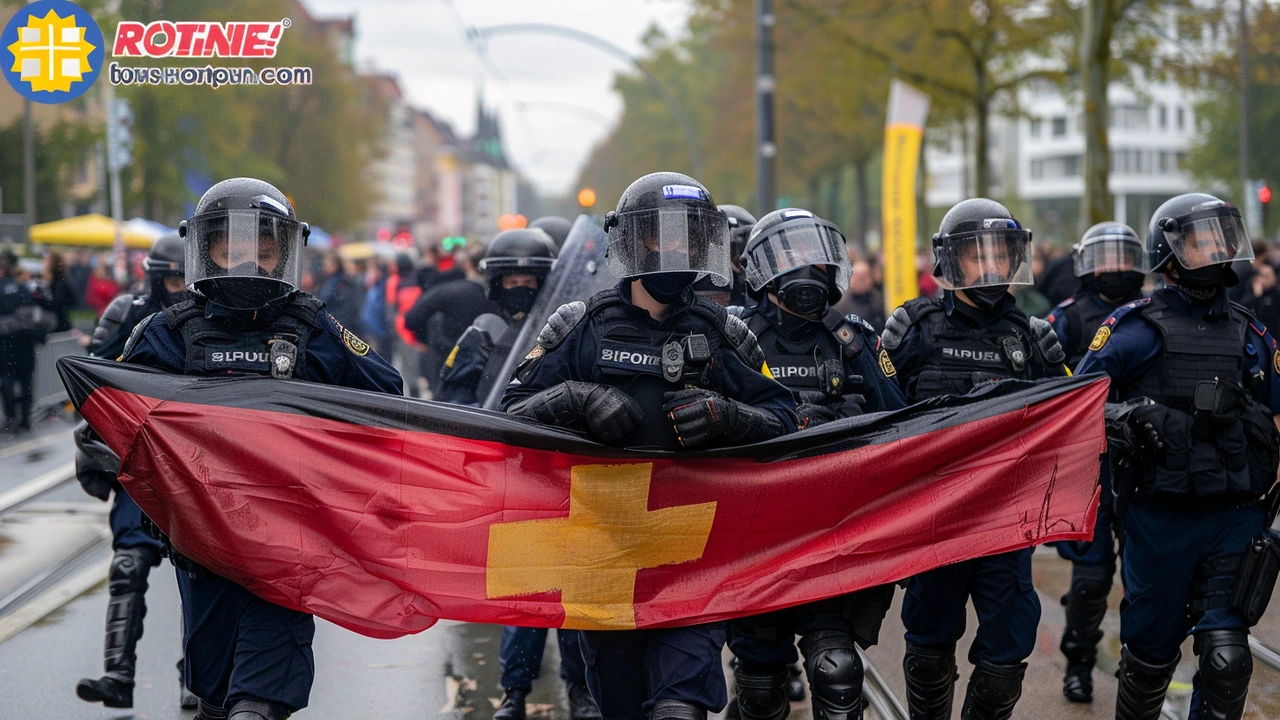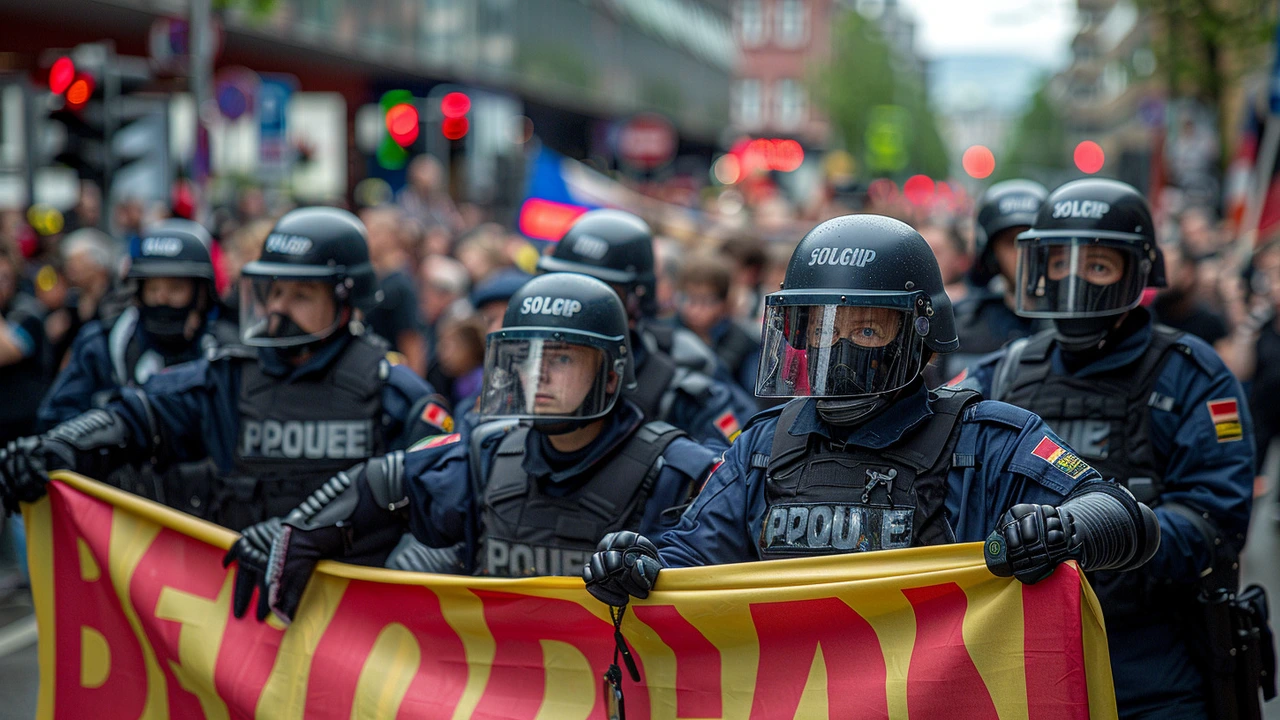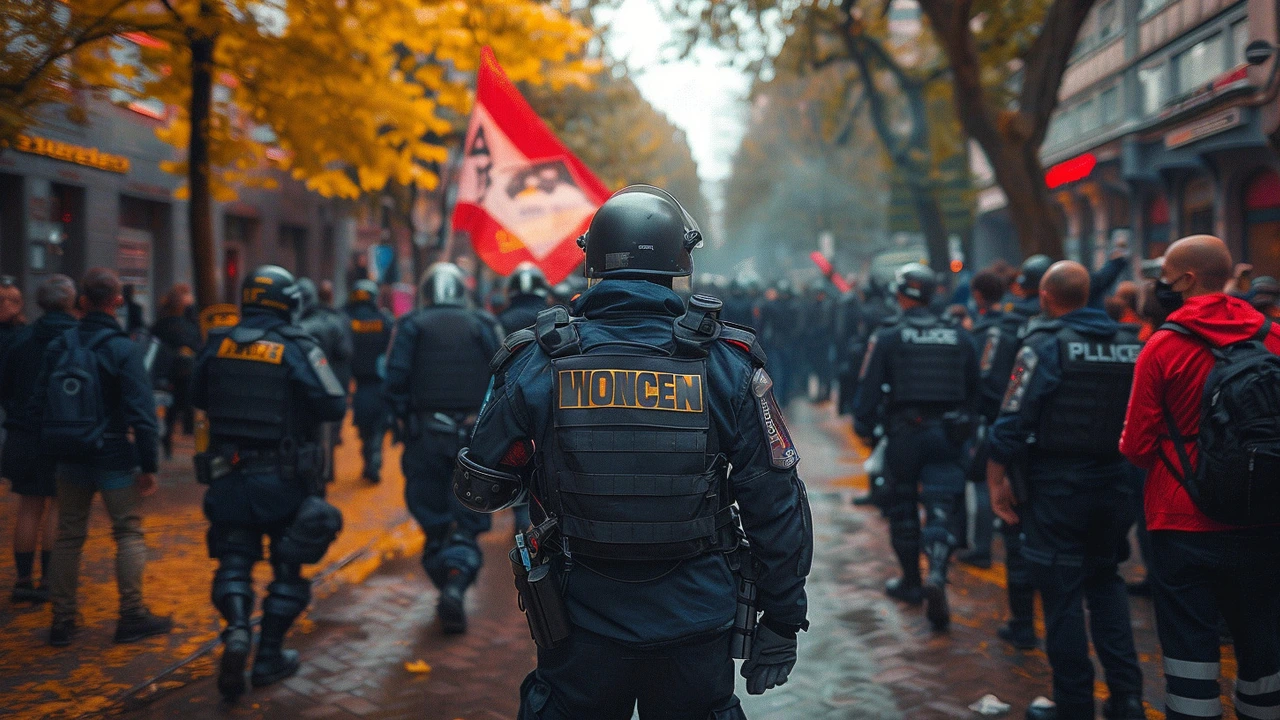Policeman's Murder Escalates Political Tensions in Germany Ahead of EU Elections
The recent killing of a German policeman during a routine traffic stop in the town of Kassel has sent shockwaves through the nation, igniting intense political debate and heightening fears of escalating violence ahead of the European parliamentary elections. The tragic incident involved a 26-year-old officer who was shot and lost his life, while the suspect, a 55-year-old German man, has been apprehended and is currently under investigation for potential connections to far-right extremism.
The chilling event has not only deeply affected the local community but also sparked nationwide outrage and concern among politicians, citizens, and law enforcement agencies. Many see this incident as a stark sign of the growing political polarization and violence that has been brewing in Germany. Chancellor Angela Merkel swiftly condemned the attack, alongside other political leaders, calling for calm and unity in these turbulent times.
Questions surrounding the role of far-right groups in Germany and the effectiveness of the country's measures to combat extremism have risen sharply to the fore. The timing of this incident could not be more sensitive, as Germany is gearing up for the European parliamentary elections. These elections are expected to be fiercely contested, especially by far-right and anti-immigrant parties, making the current atmosphere even more charged.
The Incident Unfolds
Details of the incident are still emerging, but what is known paints a grim picture. The young policeman had been performing what seemed to be a routine traffic stop when he was suddenly attacked. The suspect, identified as a 55-year-old man, reportedly opened fire, leading to the officer’s tragic death. The speed and brutality of the attack have left many questioning how such violence could erupt in a simple traffic stop.
Authorities quickly arrested the suspect and launched a thorough investigation. Early reports suggest that the suspect may have connections to far-right extremist groups, a revelation that has further fueled anxiety and speculation about the motivations behind this horrific act.
Political Reactions and Public Sentiment
The response from Germany's political landscape was swift and unequivocal. Chancellor Angela Merkel, in a public statement, expressed her deepest condolences to the officer's family and reiterated the government's commitment to confronting political violence and extremism head-on. Merkel’s call for unity was echoed by other leaders across the political spectrum, who warned against allowing this incident to deepen societal divisions.
Citizens, too, have voiced their concerns, with many expressing fear and frustration over the growing instances of politically motivated violence. Public gatherings and vigils in honor of the slain officer have become venues for people to not only mourn but also to call for stronger action against extremism. The shared grief has paradoxically become a rallying point for communities seeking peace and stability.

Examining Far-Right Extremism in Germany
The incident in Kassel has once again cast a spotlight on the issue of far-right extremism in Germany. Despite numerous efforts to clamp down on such activities, these groups continue to pose a significant threat. In recent years, political violence linked to far-right ideologies has been on the rise, with several high-profile incidents making headlines.
A 2019 federal report highlighted that there were over 24,000 individuals classified as right-wing extremists, about 50% of whom are considered violence-prone. This alarming statistic underscores the ongoing challenge faced by German authorities in curbing the influence and activities of these groups. Experts argue that while significant strides have been made in monitoring and thwarting organized far-right movements, more needs to be done to address the root causes of radicalization and hate.

Implications for the European Parliamentary Elections
The timing of this tragic event could have far-reaching implications for the upcoming European parliamentary elections in Germany. The rise of far-right and anti-immigrant parties has been a noticeable trend in recent years, reflecting broader discontent and fears among portions of the electorate. This election is poised to be a critical battleground, with these parties aiming to significantly influence the political agenda.
The Kassel policeman’s murder has ushered in a wave of debates and discussions about the security environment and political stability in the country. Many voters are now more acutely aware of the persistent dangers posed by extremist ideologies, and this awareness could potentially shape the election outcomes. Parties across the spectrum will likely adjust their campaign strategies in light of these recent events, perhaps focusing more on law and order, unity, and the dangers of divisive rhetoric.
Calls for Unity and Stronger Measures
In the aftermath of the killing, there has been a chorus of calls for a united front against extremism. Political leaders, civil society groups, and ordinary citizens are advocating for stronger measures to prevent further acts of violence. Proposals include increased funding for law enforcement, more comprehensive monitoring of extremist groups, and educational campaigns to promote tolerance and inclusivity.
These calls for action are not without controversy. Some argue that stepped-up enforcement measures may infringe on civil liberties, while others feel that current efforts are insufficient to address the deeply ingrained issues of hate and intolerance. The balance between security and freedom remains a delicate and contentious topic.

Community Resilience and Hope
Amidst the pain and fear, there are also stories of resilience and hope. Communities across Germany are coming together to support one another and to stand against hatred and division. The unity seen in vigils and community gatherings serves as a powerful reminder that, even in the face of tragedy, people can find common ground and work towards a better future.
Educational initiatives, dialogue programs, and community outreach efforts are gaining traction as methods to build bridges and foster understanding. By emphasizing shared values and human connections, these programs aim to mitigate the factors that lead to radicalization and violence.
Conclusion
The murder of a policeman in Kassel is a somber reminder of the challenges facing Germany as it confronts political extremism and prepares for crucial elections. The incident has not only highlighted the dangers posed by far-right groups but also underscored the importance of unity and resilience. As the country navigates this turbulent period, the collective efforts of its leaders, citizens, and community groups will be crucial in shaping a peaceful and stable future.
For Germany, the road ahead may be fraught with difficulties, but the determination to uphold democratic values and combat extremism remains a strong beacon of hope.
